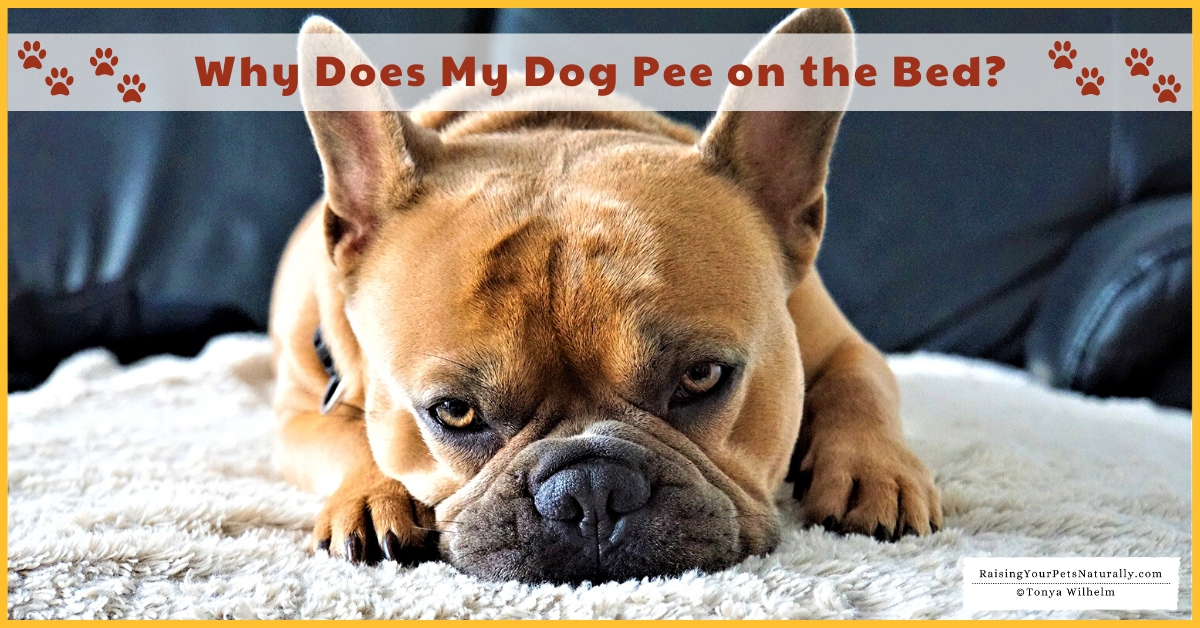
Dog Keeps Peeing in House

If your dog suddenly starts to urinate in your house, on your bed, couch, or even pees on you for attention, you are not alone. However, it may not be a case of a dog behavioral problem. Here are a few things to look at when your dog keeps peeing in the house or on odd surfaces.
Medical Reasons a Dog or Puppy May Start Peeing on the Bed or Indoors
Advisor for betterpet, Dr. Mason Romero, DVM offers these possible underlying health issues that may be causing your otherwise house-trained dog to suddenly pee indoors or excessive urination.
- Crystals in the Urine: These create inflammation in the bladder and the urethra that can result in a sense of urgency to urinate.
- Cystitis: This is an inflammatory condition of the bladder wall that creates a sense of urgency as well. It is usually a sterile process, meaning there is no underlying urinary tract infection.
- Endocrine Diseases such as Diabetes and Cushing’s Disease: Hallmark signs of these diseases are increased thirst and frequency of urination. Typically the dog will be drinking an excessive amount of water, which ultimately results in them needing to urinate more frequently and likely not being able to hold it as long when you are not home.
- Tumors in the Bladder or on the Adrenal Glands
- Cognitive Problems Secondary to Disease in the Brain
- Urinary Tract Infections
- Urinary Bladder Stones
- Kidney or Liver Disease
Dog Dripping Urine
If your dog or puppy is peeing in his sleep or seems to just drip urine, this is called urinary incontinence. The urine can be a little dribble all the way to a full-sized pee. Don’t confuse this with submissive urination, more on that bellow.
Diagnosing Your Dog’s Medical Condition
The first step in stopping your dog from peeing in the house is to get a proper diagnosis. If it’s a medical condition, this can only be accomplished by seeing your dog’s veterinarian. Your veterinarian will ask you some questions about your dog’s behavior, urination frequency, and drinking habits.
Dr. Romero explains, “Typically the veterinarian will want to run blood work such as a CBC and chemistry panel, urinalysis, and possibly radiographs of the abdomen. These diagnostics are non-invasive and results are usually received quickly. To rule out conditions that may be impacting the brain, more advanced diagnostics may be indicated such as an MRI or CT. On occasion, dogs may need to have an endoscopy of the urinary tract.”
Are Urinary Problems Prevalent in Dogs?
Absolutely! I can say just from my dog training experience, when I have sent many dogs to their veterinarian prior to “fixing a potty problem,” almost always the dog has had some kind of medical condition that needed addressing. I will say that it is important to really work with your veterinarian on a diagnosis. Don’t just rule out urinary tract infection (UTI). As you can see from the long list of possibilities, there is more than one reason a dog may have excessive urination or start peeing in the house.
Dr. Romero states, “Urinary problems in dogs are seen quite frequently in practice. It is one of the more common presentations we see for sick pets.” He offers this advice to monitor your dog’s health. “Some things to watch for at home are increased thirst. It can be difficult to know if your pet is drinking more water than normal without measuring the daily amount they are drinking. A good way to do this is to measure the amount daily for 3-5 days and inform your veterinarian. They will be able to calculate if the amount is excessive or normal. Watch for weight gain, weight loss, and increased appetite as these can be other signs for endocrine disease.”
He continues to offer these tips on female vs. male dogs urination habits: “For female dogs, watch for squatting to urinate in multiple areas when she goes outside. Typically females will void their bladder in one spot whereas male dogs may urinate in multiple spots. Also, watch for straining to urinate or any discoloration in the urine.”
Behavioral Reasons a Dog or Puppy May Pee in the House
If your dog has not been properly potty trained, he still may be peeing in your house. For more information on how to house train your dog and crate training, visit these two articles. How to potty train a dog. Crate training a puppy.
If your dog is fearful or anxious, he may also pee indoors, particularly around any kind of change in environment. The first step would be to address your dog’s anxiety and seek a qualified dog behavioral counselor.
Why Does My Dog Pee When Excited?
Submissive urination is the phrase used when a dog pees when he’s excited or even nervous. Some dogs will not only pee but roll over on their back, and the pee can go shooting up! It’s a behavior from a puppy’s first few weeks, when a momma dog had to lick the puppy’s private area in order for the puppy to eliminate. This is likely why it’s a submissive gesture.
How to Stop Submissive Urination
First, never punish your dog. Seriously, folks, punishment is riddled with problems and side effects. When you are talking about a dog showing you he is already submissive, punishment is only going to make the problem even worse, i.e. Peeing more.
Be calm and ignore your dog or puppy at times he typically submissively urinates. If you come home from work and your dog starts peeing out of excitement, casually say hello, do something in the house for a minute or two, then greet your dog. You may even need to open your back door to your fenced-in yard to allow your dog to follow you outside, but still don’t greet him for a moment.
Final Thoughts on Dogs Urinating in the House
Remember, dogs are a lifetime commitment. It is our responsibility as dog parents to positively train them, take them to the veterinarian, maybe even get a second opinion in order to find the correct diagnosis. Your dog’s inappropriate urination may need a team of professionals to get to the root of the problem. IMO dogs are worth every penny and every minute of time it takes to ensure they have the best life possible.
Do you have a senior dog? Tell me in the comments.
Are you looking for even more ways to stay up to date with Raising Your Pets Naturally? Sign up for the newsletter for more tips and promotions. Don’t forget to be social and Like, Follow and Subscribe. Comments below are always welcome.
Facebook Twitter Pinterest Instagram YouTube
 |
 |




